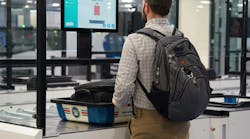I was recently reflecting on several news articles reporting on the influx of “service animals” on passenger aircraft – furry, feathery, fleecy, and otherwise hide-covered creatures allowed to accompany persons with various disabilities on board aircraft as a result of the 1986 Air Carrier Access Act, and later the Americans with Disabilities Act of 1990. In general, it made sense, particularly for the most visible of the genre, the seeing-eye dog for the blind. In the past few years, there is also been an improved awareness of the so-called “hidden” disabilities such as autism, dementia, deafness and low vision, among others.
More on the animals in a moment. However, the recognition of those hidden disabilities has engendered some excellent progress in such areas as smart glasses for the blind, to sensory rooms for passengers with autism, and some common sense procedural training and assistive measures being expanded in the UK, such as signage to less stressful quiet areas, and lanyards for passengers with hidden disabilities as a signal to staff to suggest they might need assistance.
Passengers with vision impairments can now use smart-glasses when flying from Memphis, Minneapolis-St. Paul, and both Houston airports - Bush Intercontinental and Hobby. Often, people on the autism spectrum struggle with social interaction and may respond negatively to touching or invasion of personal space. Toronto Pearson airport offers a free smartphone app that guides such people who like structured guidance, including those with autism, ADHD, Asperger’s, Down’s syndrome, dementia and other cognitive special needs; Brisbane Airport published a step-by-step guide through the airport, outlining what to expect in security, immigration etc., so the traveler faces few surprises.
However, back to the idea of service animals for the disabled: there has also been a significant challenge to the definition of reasonableness when, as those news items report, literally dozens of online services have arisen that will provide sight-unseen “certification” of the medical and/or emotional necessity for you to be accompanied by your service pig, pony, peacock, parrot, possum, python or panda … about 250,000 of them on one major carrier, and in many cases for free rather than as paid cargo. Imagine boarding your flight to find yourself seated next to some unruly carnivore that just left a little surprise on the floor at your feet. Yes, it happens, somewhat regularly, especially when they are nervous.
Clearly, many people simply want to bring little Muffin on vacation with them, without the bother and expense of a kennel or a house-sitter; but what emotional deficiency is enhanced by sharing 29 inches of center row seat pitch with a small pony or a large bird with feathers 4 feet long who can peck your eye out when irritated by the service monkey or the 6-year old kid in the next seat. On the other hand, it is comforting to know that peacocks eat berries, grains, small mammals, reptiles, small snakes and insects, so maybe we can hope for some natural selection happening on the way to Pittsburgh. Pork chops and drumsticks for Business class dinner.



